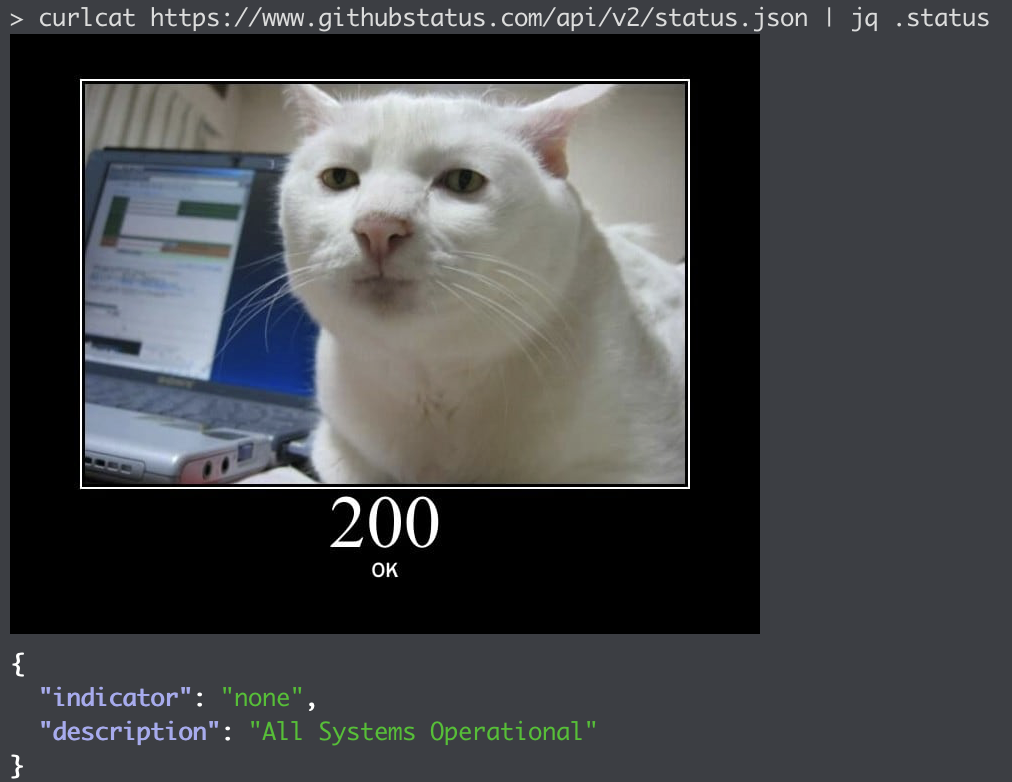A while ago I made a tiny function in my ~/.zshrc to download a video from the link in my clipboard. I use this nearly every day to share videos with people without forcing them to watch it on whatever site I found it. What’s a script/alias that you use a lot?
# Download clipboard to tmp with yt-dlp
tmpv() {
cd /tmp/ && yt-dlp "$(wl-paste)"
}
Technically not an alias, because I just use nushell’s history + autocompletion everytime I use it, but one could alias it. I think I might even write a custom command for it, with
pathargument, some day. Anyway, here it goes:rsync -aPh -e "ssh -p 2222" test@172.16.0.86:/storage/emulated/0/PicturesArchive/ ~/PicturesArchive/I run an ssh daemon on my phone, and use this snippet to back up my photos.
alias qr='qrencode -t ansiutf8'This makes qr codes in the terminal.
needs the
qrencodepackageExample usage and output:
felix@buttsexmachine:~$ qr lemmy.fish █████████████████████████████ █████████████████████████████ ████ ▄▄▄▄▄ █▄ ██ █ ▄▄▄▄▄ ████ ████ █ █ █ █▄▀▄█ █ █ ████ ████ █▄▄▄█ █▄▄▄███ █▄▄▄█ ████ ████▄▄▄▄▄▄▄█▄▀ █▄█▄▄▄▄▄▄▄████ ████▄▄▄ █▀▄▀▄▀ █▀▄▀▀ █ ████ ████▄ ▀▄▀▄▄ ▀▄▄█ ▄▄▄█▀█ ▄████ ██████▄███▄█▀█ ▄█▄ █▀█▀▄▄████ ████ ▄▄▄▄▄ ██ ▀▀▀▀▄ ▀█▀████ ████ █ █ █▀ ▀▄█▀▀▄▄ ▀█████ ████ █▄▄▄█ █ ▀█ ▀█▀ █▄▄█▀████ ████▄▄▄▄▄▄▄█▄▄█▄▄▄███▄▄██████ █████████████████████████████ █████████████████████████████ ```*___*alias cd…=“cd …”
I have something similar.
alias "..1=cd .." alias "..2=cd ../.." ... etcI did have code that would generate these automatically but Idk where it is.
Polls for potential zombie processes:
# Survive the apocalypse function zombies () { ps -elf | grep tsc | awk '{print $2}' | while read pid; do lsof -p $pid | grep cwd | awk '{printf "%-20s ", $2; $1=""; print $9}' done } export -f zombies alias zeds="watch -c -e -n 1 zombies"# Copy pwd into clipboard using pbcopy alias cpwd="pwd | tr -d '\n' | pbcopy && echo 'pwd copied into clipboard'"git() { if [ "$1" = "cd" ]; then shift cd "./$(command git rev-parse --show-cdup)$*" else command git "$@" fi }This lets you run
git cdto go to the root of your repo, orgit cd foo/barto go to a path relative to that root. You can’t do it as an alias because it’s conditional, and you can’t do it as agit-cdcommand because that wouldn’t affect the current shell.git() { if [ "$1" = clone ]; then shift set -- clone --recursive "$@" fi command git "$@" }Is this just meant to make git clone always clone recursively?
Can’t you do this with aliases in your .gitconfig?
yes it is. idk😄 i have a similar one for github-cli
Currently using this to resize screenshots in a Word doc
#Requires AutoHotkey v2.0
^+1:: { Send “{RButton}z{Tab 3}4{Enter}” }
I don’t have anything too fancy. I use [theFuck(https://github.com/nvbn/thefuck) to handle typos, and I have some variables set to common directories that I use.
# grep search the current directory function lg() { ls -alt | grep $1 }I often want to know the status code of a
curlrequest, but I don’t want that extra information to mess with the response body that it prints to stdout.What to do?
Render an image instead, of course!

curlcattakes the same params ascurl, but it uses iTerm2’simgcattool to draw an “HTTP Cat” of the status code.It even sends the image to stderr instead of stdout, so you can still pipe
curlcattojqor something.#!/usr/bin/env zsh stdoutfile=$( mktemp ) curl -sw "\n%{http_code}" $@ > $stdoutfile exitcode=$? if [[ $exitcode == 0 ]]; then statuscode=$( cat $stdoutfile | tail -1 ) if [[ ! -f $HOME/.httpcat$statuscode ]]; then curl -so $HOME/.httpcat$statuscode https://http.cat/$statuscode fi imgcat $HOME/.httpcat$statuscode 1>&2 fi cat $stdoutfile | ghead -n -1 exit $exitcodeNote: This is macOS-specific, as written, but as long as your terminal supports images, you should be able to adapt it just fine.
LOVE this
this one is clean asl
I wrote a script called
please. You inputpleasefollowed by any other command (e.g.please git clone,please wget blahblah) and a robotic voice will say “affirmative,” then the command will run, and when it completes, the robotic voice reads out the exit code (e.g. “completed successfully” or “failed with status 1” etc.)This is useful for when you have a command that takes a long time and you want to be alerted when it’s finished. And it’s a gentleman.
pleaseshare the script?
It’s full of random shit I put in as a joke, but here it is. You can use
please -sto get lightly roasted when your command fails.spoiler
#!/bin/bash # announces success or failure of task if ! command -v "spd-say" > /dev/null then echo "spd-say must be installed." exit -1 fi VOLUME=0 SERIOUS=1 FINISH_ONLY=0 if [ $# -ge 2 ] then if [ $1 == "-i" ] then # parse volume from command line VOLUME=$2 shift 2 fi fi spd-say -C # force stop speech synthesizer killall -q speech-dispatcher # androgynous voice # __sayfn="spd-say -i -80 -t female3" # deep voice __sayfn="spd-say -i $VOLUME -r -10 -p -100 -t male3" function _sayfn { $__sayfn "$@" 2>/dev/null if [ $? -ne 0 ] then $__sayfn "$@" fi } if [ $# -eq 0 ] || [ "$1" == "--help" ] then _sayfn "Directive required." echo "Usage: please [-i volume] [-s|--serious] [-f|--finish] <command...>" echo " please [-i volume] --say text" echo " -i: volume in range -100 to +100" echo " --serious, -s: no silliness. Serious only. (Just kidding.)" echo " --finish, -f: do not announce start" exit -2 fi # threading issue sleep 0.001 if [ $# -ge 2 ] then if [ $1 == "--say" ] then # _sayfn the given line shift 1 _sayfn "$@" exit 0 fi if [ $1 == "--serious" ] || [ $1 == "-s" ] then shift 1 SERIOUS=0 fi if [ $1 == "--finish" ] || [ $1 == "-f" ] then shift 1 FINISH_ONLY=1 fi fi i=$(shuf -n1 -e "." "!") # inflection on voice if [ "$FINISH_ONLY" -eq 0 ] then if [ "$SERIOUS" -eq 0 ] then # startup lines (randomized for character) _sayfn -r -5 -x ".<break time=\"60ms\"/>$(shuf -n1 -e \ 'Proceeding As Directed...' \ 'By your command...' \ 'By your command...' \ 'By the power ov greyskaall!' \ 'By your command,line...' \ 'As you wish...' \ 'Stand by.' \ 'Engaged...' \ 'Initializing...' \ 'Activating' \ 'At once!' \ "Post Haste$i" \ 'it shall be done immediately' \ 'Very well.' \ 'It shall be so.' \ "righty-o$i" \ "Affirmative$i" \ "Acknowledged$i" \ "Confirmed$i" \ )" else _sayfn -r -5 -x ".<break time=\"60ms\"/>Engaged..." fi if [ $? -ne 0 ] then _sayfn "Speech engine failure." echo "Failed to run speech engine. Cancelling task." exit -3 fi fi if ! command -v "$1" > /dev/null then # _sayfn a little faster because this exits fast. _sayfn -r +10 "Unable to comply? invalid command." >&2 echo "$1: command not found." exit -4 fi eval " $@" result=$? i=$(shuf -n1 -e "," "!" "?") # inflection on voice transition=$(shuf -n1 -e "; error" ", with error" "; status") taskname=$(shuf -n1 -e "task" "task" "command" "objective" "mission" "procedure" "routine") errtext=$(shuf -n1 -e "Task_failed" "Task_failed" "Task_resulted_in_failure" "Procedure_terminated_in_an_error" "An_error_has_occurred" "Auxilliary_system_failure" "system_failure") consolation=$(shuf -n1 -e "" "" "" "" "" "" "" "" "" "" "" "" "" "" "" "" "" "" "" "" "" "" "" "" "" "" "" "" "Attention required." "Attention is required!" "Perhaps It was inevitable." "It may or may not be cause for alarm." "Perhaps Machines too, are fallible." "Apologies" "Hopefully nobody else was watching" "shazbot" "maybe next time." "Nobody could have predicted this outcome." "I'm very sorry." "how unfortunate." "remember: don't panic" "oh dear" "Nothing could have been done to prevent this" "Remember: No disasters are fully preventable" "perhaps the only winning move is not to play" "Remember: Failure is our teacher, not our undertaker." "Remember: If at first you don't succeed... try again." "Remember: If at first you don't succeed... try... try again." "But your friends still love you." "Remember: the machine is not your enemy." "Command?" "Awaiting further instructions." "Remember: Logic is the beginning of wisdom... not the end of it." "Remember: When you eliminate the impossible, whatever remains, however improbable, must be the truth." "Keep at it. Victory is within reach." "Remember: The road to success and the road to failure are almost exactly the same." "Now, while this could have gone better, it could also have gone much worse." "Remember: we do this not because it is easy, but because we thought it was going to be easy." "Don't give up." "It has now been... -- zero... -- days, since the last serious failure." "Remember: instead of documenting the problem, you can fix it." "Remember: Artificial intelligence is no match for artificial stupidity." "Standing by," "Remember: with every failure, we get closer to success." "We live in a society." "sometimes failure is not an option; it's a necessity." "Keep at it." "Remember: mistakes are just the first step on the road to failure... <break time=\"250ms\"/> I mean success." "Don't leave. The drones need you... <break time=\"350ms\"/> They look up to you." "Try again, for great justice." "fantastic" "brilliant" "did you really think that would work?") if [ $SERIOUS -eq 0 ] then # perhaps some silliness. if [ $result -eq 0 ] then _sayfn --wait "$(shuf -n1 -e \ "$taskname complete. All systems nominal" \ "$taskname completed successfully." \ "$taskname resulted in success." \ "$taskname yielded a successful result." \ "$taskname concluded successfully." \ "$taskname completed as instructed." \ "Jobs done." \ )" & else if [ $result -eq 1 ] then _sayfn -x --wait "$(shuf -n1 -e \ "Alert$i Primary system failure. Attention is required." \ "Alert$i System failure$i Attention required! $consolation" \ "Alert$i $taskname resulted in failure! <break time=\"150ms\"/> $consolation" \ "Alert$i $taskname was not completed as intended; $consolation" \ "Alert$i An error has occurred! <break time=\"220ms\"/> $consolation" \ )" & else _sayfn --wait -x "Alert$i $errtext$transition code $result! <break time=\"350ms\"/> $consolation" & fi fi else # no silliness here. if [ $result -eq 0 ] then _sayfn --wait "Command complete." else if [ $result -eq 1 ] then _sayfn -x --wait "Alert. Command failed; error code $result!" fi fi fi exit $resultThat’s so neat
You can also use something like notifyd to generate a pop up for visual feedback :) I can’t remember the exact command right now though. Differs per distro or desktop environment, obviously.
Also,
printf '\a'will output an alert bell character which should make the terminal beep/blink and be highlighted for attention by your wm/compositor if it’s unfocused.I have that aliased to
ato get notified whenever a long running command finishes just by adding;aat the end.notify-send 'command finished!'works pretty well
I once experimented with something similar, except it was supported to trigger my smart speaker and drop into another part of the house to tell me.
Honestly, I really need to replace my proprietary smart speaker system with something self-hosted; it’s just I only recently have had the time to start cinsidering.
Here are probably the most useful ones. I prefer for
rmto be interactive so I don’t accidentally delete something important and formkdirto create a parent directory if necessary.alias rm='rm -i' alias mkdir='mkdir -p' alias podup='podman-compose down && podman-compose pull && podman-compose up -d'This extract function (which I didn’t make myself, I got it from when I was using nakeDeb) has been pretty useful too.
function extract() { if [ -f $1 ] ; then case $1 in *.tar.bz2) tar xvjf $1 ;; *.tar.gz) tar xvzf $1 ;; *.bz2) bunzip2 $1 ;; *.rar) unrar x $1 ;; *.gz) gunzip $1 ;; *.tar) tar xvf $1 ;; *.tbz2) tar xvjf $1 ;; *.tgz) tar xvzf $1 ;; *.zip) unzip $1 ;; *.Z) uncompress $1 ;; *.7z) 7z x $1 ;; *.xz) unxz $1 ;; *) echo "'$1' cannot be extracted via >extract<" ;; esac else echo "'$1' is not a valid file" fi }I have a similar docker/podman alias, except I pull first. This greatly reduces downtime between
downandup, which is nice for critical services.Yeah, that makes sense. I don’t have anything critical; just nginx, a book server, a recipe collection, and some other small stuff.
alias fucking='sudo'(my coworkers often usedprettypleaseinstead)alias sl=“ls“real ones watch the train of shame
alias sl='ls | while IFS= read -r line; do while IFS= read -r -n1 char; do if [[ -z "$char" ]]; then printf "\n"; else printf "%s" "$char"; sleep 0.05; fi; done <<< "$line"; done'I can’t easily check if it works until I get home to my laptop, but you get the idea











